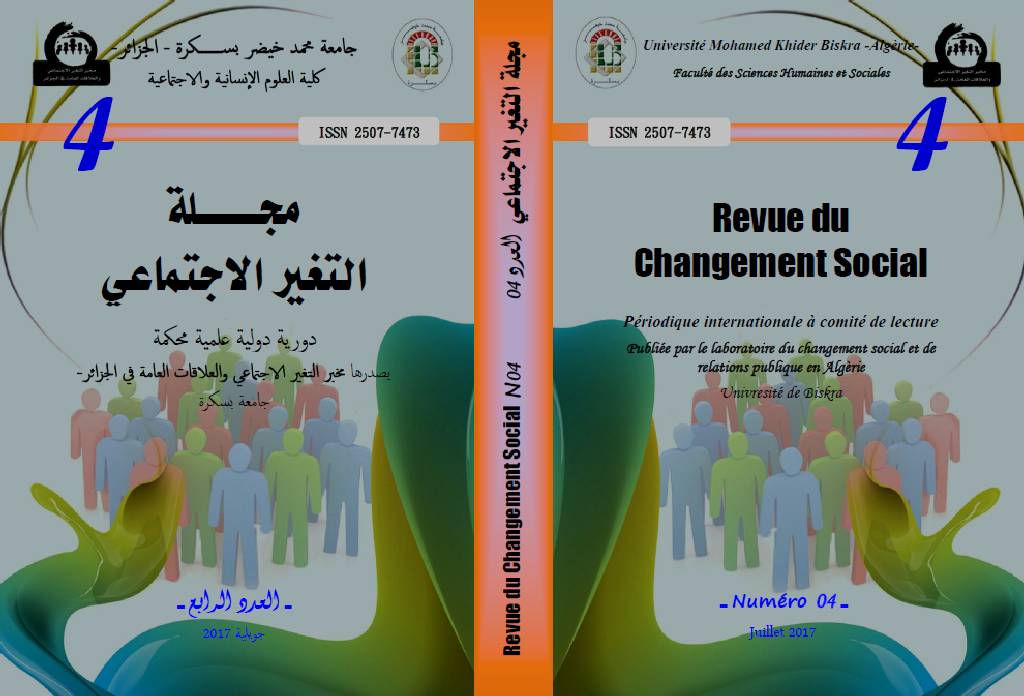أن تكون أنثروبولوجيا محليا وجهة نظر جزائرية
Résumé
من خلال المداخلة التي أقترحها تبقى الأنثروبولوجيا كتخصص فكري هي التي تهمني أكثر من ماهي مهنة.
سأحاول الإجابة على السؤال التالي: هل يمكن أن نكون أنثروبولوجيين في مجتمعنا الأصلي؟ هذا التساؤل مبني على التحديد الذي أعطاهكلود ليفي ستروس للأنثروبولوجي كالباحث الخارجي والبعيد، هذا ما سوف يدفعني إلى الرجوع إلى المعنى الذي يعطيه سيمل للباحث الذي كان يصفه بالأجنبي ولكن من معنى أنه "وحدة مسافة وقرب"(سيمل، 1908). لكن تبقى الفكرة التي أود الدفاع عنها، هي أن غرابة الأجنبي-الأنثروبولوجي-الجزائري "أن هذا ليس من طبيعته ككائن ولكن هو نتيجة علاقة (...)" (ألفاروبيريس، 1997).
من جهة أخرى، هذا التساؤل يستمد أهميته من حقيقة أننا خلال الثلاثين أو الأربعين سنة الماضيةنشهد مرور الجزائر من حالة "موضوع أنثروبولوجي"، بمعنى أنها محصورة في مكانة ميدان أنثروبولوجي، (انظر بهذا الخصوص: جزائر الأنثروبولوجيين لجون كلود فاتن وفيليب لوكاس، 1975) إلى جزائر تساهم في الانتاج الأنثروبولوجي من طرف أنثروبولوجيين جزائريين ومكونين في الجزائر. هذا الواقع الجديد هو جراء توسع الأنثروبولوجيا خارج العالم الغربي، هذه النزعة، والتي انطلقت منذ نهاية الحرب العالمية الثانية، تبدو أنها لا رجعة فيها.
ولكن إذا استعرت مقولة كلود ليفي ستروس، التي ترى أن الأنثروبولوجي هو "عالم فلك العلوم الاجتماعية" أو كذلك مقارنته لعلم الاجتماع "كدراسة أنفسنا" والأنثروبولوجيا "كدراسة الآخرين"فكيفيمكنللأنثروبولوجيالجزائري أنيكونأنثروبولوجيافيمجتمعه؟فرغمكلالتطوراتالتيسجلتلأكثرمنقرن،استمرتالصبغةالهوياتيةالأولىللأنثروبولوجياكـ"دراسةالمجتمعاتوالثقافاتالأخرى،المختلفةوحتىالبعيدةعنمجتمعاتناوثقافاتنا" (أندري هبيتايل، 2007).
This paperaims to examinetheidentity of the anthropologistinhisown country This preoccupationisbased on the sensegiven by Claude Levi-Strauss to the anthropologist as external and distant to hisfieldwork. This brings me back to the sensethat Simmel gave to the researcherwhomhedescribed as a foreigner to hisfieldwork, but in the sensethat “He is the unity of distance and proximity”(Simmel, 1908). But the ideathat I willtry to defendhereisthat the strangeness of the Algerian anthropologist"isless an ontologicalattribute, its essence, than the fruit of a relationship(...)"(Alvaro Pires, 1997).
This preoccupationdrawsits importance from the factthatduring the last thirty or fortyyears a significantdevelopmentdid come in the orientation of
Algerian anthropologiststowardstheirfieldwork, transformingitfroman "anthropologized" Algeria, confined in the anthropologicalstatus of the fieldwork (See L’Algérie des anthropologuesof Jean-Claude Vatin and Philippe Lucas, 1975) to an "anthropologizing" Algeria, as a producer of an anthropologicalknowledge by the Algerian anthropologistsevolving in Algeria. This new dynamicis part of the tendency of the deployment of anthropologyoutside the western areas. This tendency, announcedsince the end of the Second World War, seems to beirreversible.
But if I refer to Levi-Strauss'smetaphoraccording to which the anthropologistis "the astronomer of the social sciences" or the comparisonthatsociologyis "the study of ourselves" and anthropology "the study of others",howcan the Algerian anthropologistevolve in / in frontofthe society to whichhehimselfbelongs? In spite of all the evolutionsrecorded over more than a century, the primarycharacteristic of the anthropology "as a study of societies and other cultures, different or evenremotefrom ours" (A.Béteille, 2007) has persisted.



